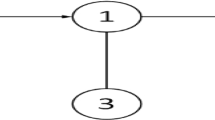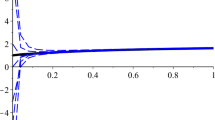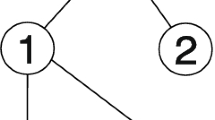Abstract
This paper investigates the leader-following consensus of nonlinear fractional-order multi-agent systems where the linear part is depicted by the general linear dynamics on directed networks with the order p belonging to \(p \in (0,1]\) and \(p \in (1,2)\), respectively. By utilizing the Mittag-Leffler function, the Laplace transform, and the inequality technique, some algebraic-type consensus tracking criteria relying on the coupling strength, the coupling gain matrix and the network structure are obtained. It is interesting to find that the leader-following consensus can be attained by only using the position information among the agent and its neighbors for \(p \in (0,1]\) and \(p \in (1,2)\). The theoretical results are illustrated by several numerical simulation examples.





Similar content being viewed by others
References
Quan, Y., Chen, W., Wu, Z., Li, P.: Distributed fault detection and isolation for leader–follower multi-agent systems with disturbances using observer techniques. Nonlinear Dyn. 93, 863–871 (2018)
Long, M., Su, H., Liu, B.: Group controllability of two-time-scale multi-agent networks. J. Frankl. Inst. 355, 6045–6061 (2018)
Su, H., Wu, H., Chen, X., Chen, M.Z.Q.: Positive edge consensus of complex networks. IEEE Trans. Syst. Man Cybern. Syst. 48, 2242–2250 (2018)
Wu, H., Su, H.: Discrete-time positive edge-consensus for undirected and directed nodal networks. IEEE Trans. Circuits Syst. II Express Briefs 65, 221–225 (2018)
Su, H., Wu, H., Chen, X.: Observer-based discrete-time nonnegative edge synchronization of networked systems. IEEE Trans. Neural Netw. Learn. Syst. 28, 2446–2455 (2017)
Long, M., Su, H., Liu, B.: Second-order controllability of two-time-scale multi-agent systems. Appl. Math. Comput. 343, 299–313 (2019)
Ren, H., Peng, Y., Deng, F., Zhang, C.: Impulsive pinning control algorithm of stochastic multi-agent systems with unbounded distributed delays. Nonlinear Dyn. 92, 1453–1467 (2018)
Su, H., Wu, H., Lam, J.: Positive edge-consensus for nodal networks via output feedback. IEEE Trans. Autom. Control. 64, 1244–1249 (2019)
Wang, Y., Yang, W., Xiao, J., Zeng, Z.: Impulsive multisynchronization of coupled multistable neural networks with time-varying delay. IEEE Trans. Neural Netw. Learn. Syst. 28, 1560–1571 (2017)
Su, H., Liu, Y., Zeng, Z.: Second-order consensus for multiagent systems via intermittent sampled position data control. IEEE Trans. Cybern. https://doi.org/10.1109/TCYB.2018.2879327 (to be published)
Li, X., Su, H., Chen, M.Z.Q.: Flocking of networked Euler Lagrange systems with uncertain parameters and time-delays under directed graphs. Nonlinear Dyn. 85, 415–424 (2016)
Su, H., Long, M., Zeng, Z.: Controllability of two-time-scale discrete-time multiagent systems. IEEE Trans. Cybern. https://doi.org/10.1109/TCYB.2018.2884498 (to be published)
Wang, Y., Liu, X., Xiao, J., Shen, Y.: Output formation-containment of interacted heterogeneous linear systems by distributed hybrid active control. Automatica 93, 26–32 (2018)
Su, H., Zhang, J., Chen, X.: A stochastic sampling mechanism for time-varying formation of multiagent systems with multiple leaders and communication delays. IEEE Trans. Neural Netw. Learn. Syst. https://doi.org/10.1109/TNNLS.2019.2891259 (to be published)
Wang, X., Su, H.: Self-triggered leader-following consensus of multi-agent systems with input time delay. Neurocomputing 330, 70–77 (2019)
Su, H., Ye, Y., Qiu, Y., Cao, Y., Chen, M.Z.Q.: Semi-global output consensus for discrete-time switching networked systems subject to input saturation and external disturbances. IEEE Trans. Cybern. https://doi.org/10.1109/TCYB.2018.2859436 (to be published)
Wang, Y., Yang, W., Xiao, J., Liu, Z.: Coordination of networked delayed singularly perturbed systems with antagonistic interactions and switching topologies. Nonlinear Dyn. 89, 741–754 (2017)
Torvik, P.J., Bagley, R.L.: On the appearance of the fractional derivative in the behavior of real materials. J. Appl. Mech. 51, 725–728 (1984)
Podlubny, I.: Fractional-order systems and \(PI^{\lambda } D^{\mu }\)-controllers. IEEE Trans. Autom. Control 44, 208–213 (1999b)
Tavazoei, M.S., Haeri, M.: Limitations of frequency domain approximation for detecting chaos in fractional order systems. Nonlinear Anal. 69, 1299–1320 (2008)
Podlubny, I.: Fractional Differential Equations. Academic Press, San Diego (1999a)
Cao, Y., Li, Y., Ren, W., Chen, Y.: Distributed coordinative of networked fractional-order systems. IEEE Trans. Syst. Man Cybern. Part B (Cybern.) 40, 362–370 (2010)
Sun, W., Li, Y., Li, C., Chen, Y.: Convergence speed of a fractional order consensus algorithm over undirected scale-free networks. Asian J. Control 15, 1–11 (2013)
Shen, J., Cao, J., Lu, J.: Consensus of fractional-order systems with non-uniform input and communication delays. Proc. Inst. Mech. Eng. Part I J. Syst. Control Eng. 226, 271–283 (2012)
Shen, J., Cao, J.: Necessary and sufficient conditions for consensus of delayed fractional-order systems. Asian J. Control 14, 1690–1697 (2012)
Zhu, W., Li, W., Zhou, P., Yang, C.: Consensus of fractional-order multi-agent systems with linear models via observer-type protocol. Neurocomputing 230, 60–65 (2017)
Bai, J., Wen, G., Rahman, A., Chu, X., Yu, Y.: Consensus with a reference state fractional-order multi-agent systems. Int. J. Syst. Sci. 47, 222–234 (2015)
Yu, W., Li, Y., Wen, G., Yu, X., Cao, J.: Observer design for tracking consensus in second-order multi-agent systems: fractional order less than two. IEEE Trans. Autom. Control 62, 894–900 (2017)
Yu, Z., Jiang, H., Hu, C., Yu, J.: Necessary and sufficient conditions for consensus of fractional-order multiagent systems via sampled-data control. IEEE Trans. Cybern. 47, 1892–1901 (2017)
Ye, Y., Su, H., Sun, Y.: Event-triggered consensus tracking for fractional-order multi-agent systems with general linear models. Neurocomputing 315, 292–298 (2018)
Ye, Y., Su, H.: Leader-following consensus of general linear fractional-order multi-agent systems with input delay via event-triggered control. Int. J. Robust Nonlinear Control 28, 5717–5729 (2018)
Wang, J., Ma, Q., Chen, A., Liang, Z.: Pinning synchronization of fractional-order complex networks with Lipschitz-type nonlinear dynamics. ISA Trans. 57, 111–116 (2015)
Wang, F., Yang, Y.: Leader-following exponential consensus of fractional order nonlinear multi-agents system with hybrid time-varying delay: a heterogeneous impulsive method. Physica A 482, 158–172 (2017)
Wang, F., Yang, Y.: Leader-following consensus of nonlinear fractional-order multi-agent systems via event-triggered control. Int. J. Syst. Sci. 48, 571–577 (2017)
Gong, P.: Distributed tracking of heterogeneous nonlinear fractional-order multi-agent systems with an unknown leader. J. Frankl. Inst. 354, 2226–2244 (2017)
Gong, P., Lan, W.: Adaptive robust tracking control for uncertain nonlinear fractional-order multi-agent systems with directed topologies. Automatica 92, 92–99 (2018)
Gong, P., Lan, W.: Adaptive robust tracking control for multiple unknown fractional-order nonlinear systems. IEEE Trans. Cybern. 49, 1365–1376 (2019)
Hong, Y., Chen, G., Gao, L.: Tracking control for multi-agent consensus with an active leader and variable topology. Automatica 42, 1177–1182 (2006)
Caputo, M.: Linear models of dissipation whose Q is almost frequency independent. Geophys. J. Int. 13, 529–539 (1967)
Wen, X., Wu, Z., Lu, J.: Stability analysis of a class of nonlinear fractional-order systems. IEEE Trans. Circuits Syst. II Express Briefs 52, 1178–1182 (2008)
Corduneanu, C.: Principles of Differential and Integral Equations, vol. 1991, pp. 336–337. Chelsea Pub Co, New York (1977)
Acknowledgements
This work was supported by the National Natural Science Foundation of China under Grant Nos. 61873318 and 61473129, the Natural Science Foundation of Hubei Province of China under Grant No. 2018CFA058, the Wuhan Morning Light Plan of Youth Science and Technology under Grant No. 2017050304010288, the Fundamental Research Funds for the Central Universities [Grant Number HUST: 2017KFYXJJ178], and the Program for HUST Academic Frontier Youth Team.
Author information
Authors and Affiliations
Corresponding author
Ethics declarations
Conflict of interest
The authors declare that they have no conflict of interest.
Additional information
Publisher's Note
Springer Nature remains neutral with regard to jurisdictional claims in published maps and institutional affiliations.
Rights and permissions
About this article
Cite this article
Ye, Y., Su, H. Leader-following consensus of nonlinear fractional-order multi-agent systems over directed networks. Nonlinear Dyn 96, 1391–1403 (2019). https://doi.org/10.1007/s11071-019-04861-6
Received:
Accepted:
Published:
Issue Date:
DOI: https://doi.org/10.1007/s11071-019-04861-6




